- Home
- John le Carré
Single & Single Page 5
Single & Single Read online
Page 5
“He says it was suicide,” the consul repeated. And when Brock showed no further sign of having heard, “Suicide. Honestly.”
“Who does?” Brock asked, as if he were a little slow about these things.
“Captain Ali.”
“Now, which one’s that, Harry? Refresh my memory if you’d be so kind.”
But Brock knew very well which one. Long before he asked the question his innocent blue eye had singled out the grinning, lethargic figure of the local police captain in a pressed gray uniform and gold-rimmed dark glasses of which he was clearly proud, lounging with a couple of plainclothes acolytes at the edge of the mayoral party.
“The captain says he has made extensive investigations and is confident the postmortem will bear out his findings. Suicide while drunk. Case complete. He says your journey was unnecessary,” the consul added, in the forlorn hope that Brock would see this as their cue to leave.
“Suicide by what means now, exactly, Harry, please?” Brock inquired, resuming his patient study of the corpse.
The consul put this to the captain. “A bullet,” he responded to Brock after a staccato exchange. “He shot himself. Through the head.”
Brock again lifted his gaze, first to the consul and then to the captain. His eyes, being wrinkled at the corners, imparted at first sight benevolence. But to the consul they were also unsettling.
“Well, well. Yes. Thank you, Harry, I’m sure.” Brock seemed at first uncertain whether to continue, then took the plunge. “Only, if we’re to view the captain’s theory seriously, Harry, which I’ve no doubt we are, maybe he will start by telling us how a man shoots his brains out with his hands cuffed behind his back, which is the only way I can see to account for the sores on our friend’s wrists. Will you ask him that for me, please, Harry? I must say, your Turkish is first rate.”
Consul to captain again, the captain very active with his hands and eyebrows while his eyes remained blacked out by the gold-rimmed glasses.
“The handcuff marks were on our friend’s wrists when he landed at Dalaman airport,” the consul duly translated. “The captain has a witness who can testify to seeing them.”
“Landed what from, Harry, please?”
The consul put Brock’s question to the captain. “The evening flight from Istanbul to Dalaman,” he said.
“The commercial flight? The standard commercial flight?”
“Turkish Airlines. Our friend’s name is on the passenger list. The captain would be happy to show it to you.”
“And I would be happy to see it, Harry. I’m very impressed by his diligence, tell him, please.”
The consul told him. The captain accepted Brock’s compliment and resumed his testimony, which the consul translated. “The captain’s witness is a nurse by profession who sat next to our friend on the flight. She is the best nurse in the region, the most popular. She was so concerned by the state of our friend’s wrists that she begged him to let her take him to a clinic as soon as the plane landed and have them dressed. He refused. Drunkenly. Shoved her drunkenly aside.”
“Oh dear.”
From his raised stage the other side of the bathtub the captain was applying his histrionic skills to reenacting the scene that he depicted: Winser slumped ungraciously in his passenger seat, Winser brusquely waving away the well-intentioned nurse, Winser lifting his elbow to menace her.
“A second witness who rode here with our friend on the bus from Dalaman airport provides similar testimony,” the consul explained to Brock after the captain had again held forth.
“Oh, he came by bus, did he?” Brock interjected happily, in the manner of one enlightened. “A commercial flight and a commercial bus. Well, well. And him a top lawyer with a major finance house in the West End of London, using public transport. I’m very glad to hear it. I may buy their shares after all.”
But the consul would not be deflected: “Our friend and this second witness were sitting on the rear bench of the bus and side by side. The second witness is a retired policeman, the most loved policeman in the community, a father to the peasants, which makes a change. He offered our friend a fresh fig from a paper bag he was carrying. Our friend threatened to assault him. The captain possesses sworn and signed testimony from both these important witnesses, also from the bus driver and the stewardess on the aeroplane.” The captain had obligingly paused in case the distinguished gentleman from London had a question. But Brock, it seemed, had none and the smile on his face betrayed only a wordless admiration. Thus encouraged, the captain placed himself at Winser’s marbled feet and poked a punctilious forefinger at the lacerated wrists. “Furthermore these marks are not made by Turkish handcuffs,” the consul announced without the smallest hint of humor. “Turkish handcuffs are distinctive because they are more humane, more considerate of the prisoner. Don’t laugh. The captain deduces that our friend was arrested in another country, handcuffed, and either escaped or was ordered to run. The captain would like to know whether there is any record of our friend committing a crime abroad before he came to Turkey. Also whether alcohol was a feature of the offense. He would like you to assist him with this line of inquiry. He has great respect for English police methods. He says that together there is no crime you and he can’t solve.”
“Tell him I’m very flattered, please, Harry. It’s always nice to solve a crime, even if it’s only suicide. However, as regards his line of inquiry, I regret to inform him that, on paper, our friend was lily white in all respects.”
But the consul was spared the labor of translating this by a thump on the steel door. The supervisor leapt to open it and a tired Kurd was admitted bearing a bucket of ice and an enema tube. He poked one end of the tube into the bathtub and sucked the other. Melted ice splashed onto the floor and ran away in the gutters until the bathtub had dumped itself. The Kurd dumped the fresh ice into the bathtub and withdrew, his mules slapping the stone steps. The consul lurched after him, bent double, hand slammed over his mouth.
“I’m not pale. It’s just the light,” he assured Brock in a drenched murmur as he slunk back into the room.
As if provoked by the consul’s return, the mayor burst out complaining in very broken English. He was a stocky man, by build a risen laborer, and he spoke fiercely, as to a group of fellow strikers, gesticulating with powerful forearms, now at the corpse and now at the barred window beyond which lay the town entrusted to his care.
“Our friend was suicide,” he pronounced indignantly. “Our friend was thief. Is not our friend. He steal our boat. He float in boat dead. Was alcoholic. Whisky bottle was also in boat. Was empty. Which gun make this hole?” he demanded rhetorically, jabbing a stubby arm in the direction of poor Winser’s shattered head. “In this town, please, who has so big guns? Has nobody. Has all small guns. Was English gun. This Englishman drinks, he steals our boat, he shoots himself. Is thief. Is alcoholic. Is suicide. Finish.”
Brock’s kindly smile absorbed this onslaught without flinching. “I wonder if we could go back a little, Harry,” he suggested. “Assuming you’re recovered.”
“Please yourself,” the consul muttered miserably, dabbing his mouth with a paper tissue.
“Our friend came here on an internal commercial flight from Istanbul, we hear, and public bus from Dalaman. Then he shot himself, right? Now, why did he do that, I wonder? What caused him to come here in the first place? What did he get up to when he got off the bus? Did he have friends to meet? Did he book himself a room in one of the town’s many fine hotels? Was there a suicide note? Most of our English suicides like to leave a line or two behind them when they go. Where did he get his gun from? Where is the gun now, I wonder? Or have they failed to show it to us?”
Suddenly everyone was speaking at once: the hospital supervisor, the chief doctor, the captain and several members of the corporation, each anxious to outdo the other in the vigor of his denial.
“There was no suicide note and the captain was not expecting one,” the consul translated crisply,
selecting the captain’s voice from the hubbub. “Nobody who steals a boat, takes a bottle of whisky out to sea and drinks it is in a state to write notes. You ask about motive. Our friend was a mendicant. He was a degenerate. He was an escaped prisoner. Here it comes. He was a pervert.”
“That too, was he, Harry? My goodness. What gives them that impression, I wonder?”
“The police have taken the testimony of several handsome Turkish fishermen whom our friend encountered on the waterfront in the early evening and attempted to seduce,” the consul explained in an expressionless monotone. “All refused him. Our friend was a rejected homosexual, an alcoholic, a fugitive from justice. He decided to end it all. He stole a bottle of whisky, waited till dark, pinched a boat out of spite against the men who had repulsed his advances, took the boat out to sea and shot himself. The gun fell into the water. In due course, divers will be sent down to retrieve it. At present, with so many pleasure boats and cruisers in the harbor, diving would not be appropriate. Where did he have the gun from? The captain says it is immaterial where he had it from. Criminals are criminals. They seek each other out, they sell each other guns, it is well known. How did he manage to carry the gun on the internal flight from Istanbul? In his luggage. Where is his luggage? Inquiries are proceeding. In this country, that means the next millennium but one.”
Brock resumed his study of Winser’s body.
“Only, that looks to me like a soft-nosed bullet, you see, Harry,” he objected mildly. “That’s not an exit wound, that’s a splat wound. You’d need a dumdum bullet to make a hole like that.”
“I can’t do splat,” the consul warned Brock wretchedly, “it doesn’t translate,” and glanced uneasily at the route of his previous escape.
The mayor was having another tantrum. Perhaps, with the shrewdness of a politician, he was more suspicious of Brock’s equanimity than were his underlings. He began strutting up and down the cellar floor, taking the larger, more aggressive view. The English, he complained. Why did the English imagine they had a right to barge in here asking questions when they were themselves the cause of the town’s misfortune? Why does this English pederast come to our town in the first place? Why doesn’t he go to some other town and kill himself there—Kalkan? Kas? Why does he have to come to Turkey at all? Why doesn’t he stay in England, instead of spoiling people’s holidays and giving our town a bad name?
But Brock took even this tirade in good part. You could tell by his gently nodding head that he saw the force of the argument, respected the local wisdom and the local dilemma. And this sweet reasonableness gradually had its effect on the mayor, who first put a finger to his lips, and then, as an exhortation to himself to remain composed, patted the air with his palm, up and down, as if it were a cushion he was straightening. The captain, however, showed no such self-restraint. Arms raised in surrender, though he was surrendering nothing, he thrust a heroic leg forward and orated in proud sentences kept brief for the benefit of the consul.
“Our friend is drunk,” the consul translated impassively. “He is in the boat. The whisky bottle is empty. He is depressed. He stands up. He shoots himself. His gun falls into the sea. He lies down because he is dead. In winter we shall find the gun.”
Brock heard all this with every show of respect. “So can we take a look at the boat, at all, Harry?”
The mayor was back, eyes blazing. “Boat was dirty! Was too many blood! Owner from this boat very sad man, very angry! Very superstitious of God! He has burn boat. He don’t care! Insurance? He spit!”
Brock pottered alone through the narrow streets, acting the tourist as he paused to examine a display of carpets or Ottoman artifacts, or reflections in a convenient shopwindow. He had left the consul in the mayor’s office, drinking apple tea and thrashing out such technical matters as steel coffins and the regulations regarding the transportation of the dead once the postmortem had been conducted. Pleading the necessity of finding a birthday present for a nonexistent daughter, he had resisted the mayor’s offer of luncheon and been obliged in consequence to listen to lengthy recommendations regarding the town’s many superb shops, the best being undoubtedly an air-conditioned boutique belonging to the mayor’s nephew. He felt no fatigue, no slackening of his habitual quest. In the last seventy-two hours he had slept at best for six, on aeroplanes, in taxis, on his way to hastily called meetings—Whitehall in the morning, Amsterdam in the afternoon and, come evening, the twilit gardens of a drug lord’s hacienda in Marbella, for Brock had informants everywhere. People of all kinds were drawn to him and for all kinds of reasons. Even on his passage through this little town, hardened shop-keepers and restaurateurs, calling out to him to buy their wares, spotted something about him that gave them pause amid the hubbub. Some even lowered their prices in their heads. And when, in the act of crossing the road to see who around him faltered or abruptly changed direction, Brock gave a cheerful wave and an apologetic “Next time perhaps,” they discovered their intuitions in some vague way confirmed by his rejection, and followed him with their eyes, and kept a lazy lookout for him in case he should happen their way a second time.
Reaching the little fishing harbor with its white-painted lighthouse, ancient granite mole and bustling taverns, he continued to display an open pleasure in everything he saw: the chandlers and jeans shops, where, if he had had a daughter, he might have found what he was looking for; the pleasure cruisers and glass-bottomed safari boats; the little trawlers in their fishing-net mantillas; the grimy ocher jeep parked on a red dirt track cut into the hillside behind the harbor. Two figures sat in it, one boy, one girl. Even from sixty yards off, you could see they were as scruffy as the jeep. Brock entered a chandler’s, handled a few things, glanced in mirrors and settled for an amusing T-shirt that he paid for with the credit card he used for operational expenditures. Shopping bag in hand, he wandered out along the mole until he reached the lighthouse, where, quite alone, he drew a cell phone from his pocket, dialed his office in London, and at once the West Country voice of Tanby, his lieutenant, was providing him with a series of disjointed messages that were nonsense to anyone who did not know their inner meaning. Having listened to these in silence, Brock growled, “Got you,” and rang off.
A narrow wooden staircase led up to the dirt track. Brock climbed it as any tourist might. The ocher jeep had disappeared. Gaining the track, he skirted a row of half-built holiday houses and climbed another flight of stairs to an upper level, where more houses had been staked but not yet started. This second track was strewn with builders’ junk and empty bottles. Brock placed himself at the verge, a prospective buyer getting the feel of the place, picturing the view from the unbuilt houses. Siesta time was approaching. No vehicle, no pedestrian, not a dog. From the village below, two competing muezzins moaned their exhortations, the first peremptory, the second soft and winning. The ocher jeep appeared, throwing up red dust. The driver was a pebble-chinned girl with broad clear eyes and a scruffy blonde mane. Her boyfriend, if that was who he was, sulked beside her in the passenger seat. He wore a three-day beard and one earring.
Brock looked up the road and down the hillside he had just ascended. He raised a hand, the jeep stopped, the tailgate was flung open from within. On the rear seat lay a pile of rugs, some rolled, some folded. Brock sprang aboard and with an agility remarkable for his age flattened himself on the floor. The boy threw the rugs over him. The girl drove the jeep at a stately pace up the zigzag track to a plateau high on the headland and stopped.
“All clear,” said the bearded boy.
Brock emerged from the carpets and sat himself on the backseat. The boy turned on the radio, not too loud. Turkish music, clapping hands, tambourines. Ahead of them lay a red-stone quarry, disused and marked dangerous by crumbling notice boards. There was a wooden bench, now broken. There was a turning place for lorries, overgrown, and a view of six small jagged islands stepping in descending order out to sea. Across the bay white holiday villages nestled in ravines.
“Let’
s hear it,” Brock ordered.
They were Derek and Aggie and there was no lovers’ bond between them, however much Derek might wish it otherwise. Derek was shaggy and thundery in the modern idiom. Aggie was straight eyed and long legged, and unconsciously elegant. Derek gave his story while Aggie watched the mirrors and seemed not to hear. They had taken a room at the Driftwood, Derek said, with an accusing eye for Aggie—an upmarket doss-house with a tavern and a gay Irish barman called Fidelio who could get you anything you wanted.
“The whole town’s buzzing, Nat,” Aggie broke in, speaking in a trim Glaswegian accent. “There’s only the one topic from morning till night and that’s Winser. Everyone’s got a theory. Most people have two or three.”
The mayor featured in most of the rumors, Derek continued, as if Aggie had not spoken. One of the mayor’s five brothers was a big wheel in Germany. Rumor had it that he owned a heroin ring and a team of Turkish construction workers. Aggie once more interrupted.
“He owns a bunch of casinos, Nat. And a leisure center on Cyprus. Gross turnover like millions. And get this. The rumors say he’s in with one of the big Russian mobs.”
“Is he now?” Brock marveled, and allowed himself a private smile which somehow emphasized his age and apartness.
According to the rumors, Derek went on, this same brother was actually in town on the day of Winser’s death. He must have dropped in from Germany, because he was seen driving round in a limousine belonging to the sister-in-law of the chief of police for the district.
“The police chief’s brother is married to a Dalaman heiress,” Derek said. “It was her firm provided the limousines that met the private jet from Istanbul.”
“And Nat, Captain Ali rides point for the police chief ”—Aggie again, excitedly—“I mean, they’re a sackful of cats, Nat. There’s not one of them hasn’t got a piece of the other one. Fidelio says Ali actually took Wednesday off, just so he could drive the limo for his chief’s sister-in-law. Okay, Captain Ali’s not exactly a mental titan. But he was there, Nat. At the murder. Part of the action. A copper, Nat! Taking part in a ritual gang murder! They’re worse than ours!”

 The Honorable Schoolboy
The Honorable Schoolboy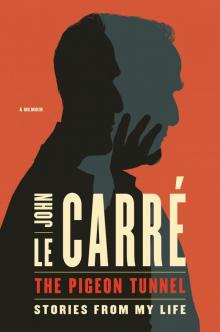 The Pigeon Tunnel: Stories From My Life
The Pigeon Tunnel: Stories From My Life Single & Single
Single & Single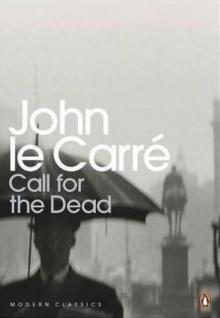 The Spy Who Came in From the Cold
The Spy Who Came in From the Cold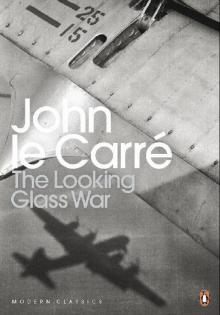 The Looking Glass War
The Looking Glass War The Night Manager
The Night Manager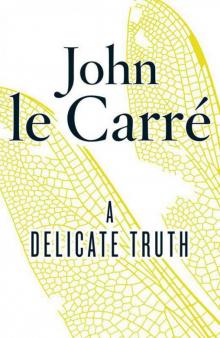 A Delicate Truth
A Delicate Truth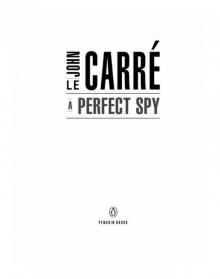 A Perfect Spy
A Perfect Spy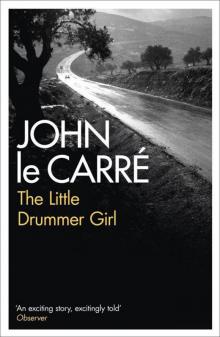 The Little Drummer Girl
The Little Drummer Girl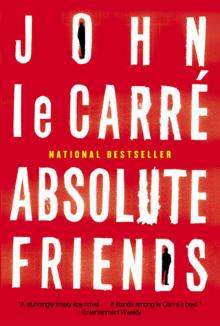 Absolute Friends
Absolute Friends A Murder of Quality AND Call for the Dead
A Murder of Quality AND Call for the Dead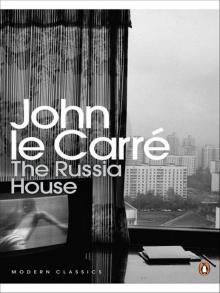 The Russia House
The Russia House The Tailor of Panama
The Tailor of Panama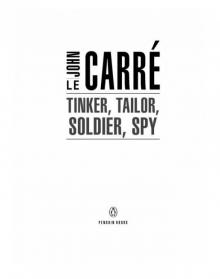 Tinker, Tailor, Soldier, Spy
Tinker, Tailor, Soldier, Spy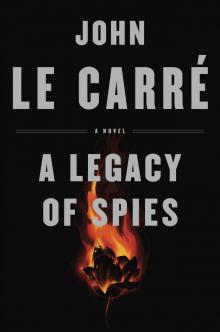 A Legacy of Spies
A Legacy of Spies The Mission Song
The Mission Song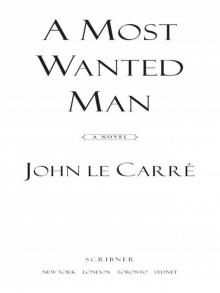 A Most Wanted Man
A Most Wanted Man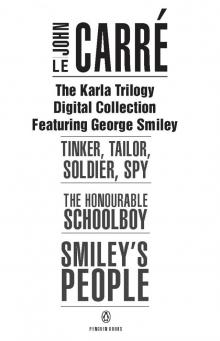 John Le Carré: Three Complete Novels
John Le Carré: Three Complete Novels The Secret Pilgrim
The Secret Pilgrim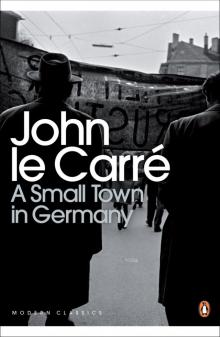 A Small Town in Germany
A Small Town in Germany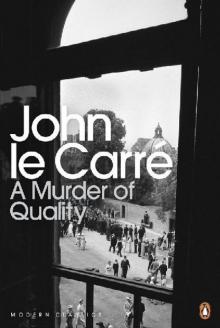 A Murder of Quality
A Murder of Quality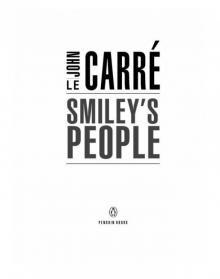 Smiley's People
Smiley's People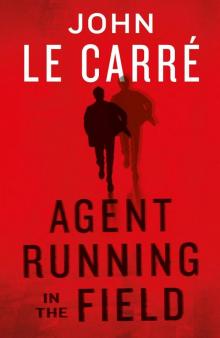 Agent Running in the Field
Agent Running in the Field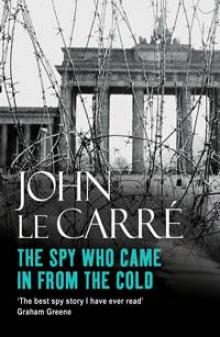 The Spy Who Came in from the Cold s-3
The Spy Who Came in from the Cold s-3 The Pigeon Tunnel
The Pigeon Tunnel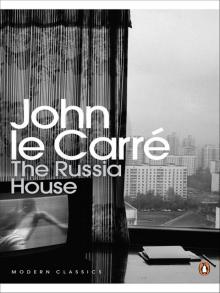 The Russia House - 13
The Russia House - 13 The Honourable Schoolboy
The Honourable Schoolboy Call For The Dead s-1
Call For The Dead s-1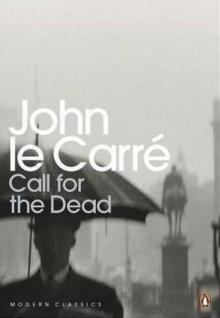 Call for the Dead
Call for the Dead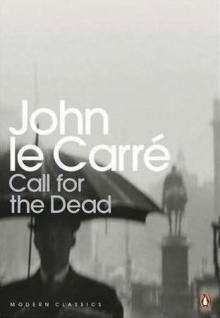 Call for the Dead - 1
Call for the Dead - 1